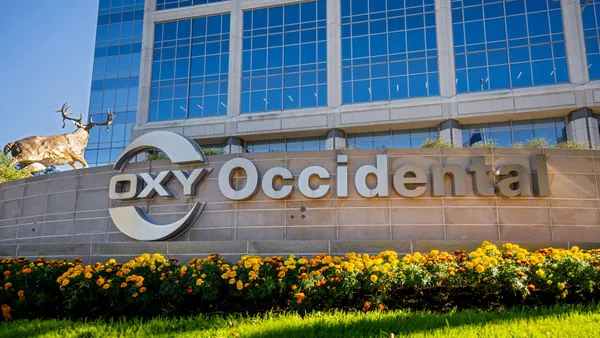Dive Brief:
- JPMorgan Chase published the first installment of a climate-focused advisory series last week that the bank says is designed to help clients understand climate risk and how to factor its financial impacts in asset prices.
- The first edition of “Climate Intuition” series looks to lay the foundation for why climate-related risk is an “increasingly relevant consideration for capital providers, capital seekers, and policy makers,” JPMorgan Chief Risk Officer Ashley Bacon and Global Head of Corporate Advisory Rama Variankaval wrote in the foreword.
- The report and its future iterations are spearheaded by Sarah Kapnick, the bank’s global head of climate advisory and former chief scientist at the National Oceanic and Atmospheric Administration. JPMorgan appointed Kapnick to lead the division last October.
Dive Insight:
The Feb. 13 report identified and expanded on several key emerging trends in what Kapnick labels a “new climate era.” She said the era is marked by factors including an increase in annual global temperatures and greenhouse gas emissions, and the volatility of insurance markets due to climate-driven natural disasters.
“Climate change is a challenge for the economy,” Kapnick wrote in an introductory note that pointed to how the onset of several emissions disclosure regulations could increase corporate compliance costs and shifts in consumers’ preference for sustainable products could impact market shares.
Adaptation struggles aside, climate change also poses a physical threat, according to Kapnick’s report. She said that extreme weather-driven catastrophes can harm infrastructure, spurring expensive repairs, insurance claims and even affecting production of products and supply chains. However, Kapnick noted that these looming challenges could also pave the way for future innovation in climate technology and drive informed decision-making.
“Success in the New Climate Era hinges on our ability to integrate climate considerations into daily decision-making,” Kapnick wrote. “Those who adapt will lead, while others risk falling behind.”
Kapnick’s prior financial and scientific background puts her in a unique position to lead JPMorgan’s climate advisory series. Prior to her two-year stint at NOAA, Kapnick worked at JPMorgan at the managing director level as a senior climate scientist and sustainability strategist in the bank’s wealth management division in 2021 and 2022, according to her LinkedIn profile. Her resume also includes working at NOAA as a research and hydroclimate scientist focused on the predictability and variability of snow and extreme storms. Kapnick’s first foray into finance came when she joined Goldman Sachs as an investment banking analyst in 2004 before her environmental research stints.
“In today’s rapidly evolving world, understanding climate risk is important for staying ahead in the financial landscape,” Bacon and Variankaval wrote in the foreword. “Sarah’s expertise on issues related to climate, energy transition, nature and biodiversity will help us better inform our clients and enhance our firm’s climate thought leadership.”
The report said that climate change will “increasingly manifest” with each additional ton of carbon dioxide emitted into the atmosphere in the form of extreme weather conditions, biodiversity loss, nature degradation and incurred economic and societal costs.
Despite increased investments and innovation in climate technology over the past decade, corporations making headwinds establishing net-zero and decarbonization plans and the introduction of several national and international sustainability-focused legislations, Kapnick wrote that much of this progress has also been reversed due to recent political and economic changes.
She attributed the withdrawal to “changes in leadership, economic conditions, and technological feasibility stagnation.” As current U.S. policies stand, global warming is expected to reach up to 2.7 degrees Celsius — surpassing the Paris Agreement’s goal of maintaining this rise below 2 degrees Celsius, she said.
The first edition of the “Climate Intuition” series comes nearly a month after President Donald Trump’s inauguration on Jan. 20. Trump began his first day in office by signing a flurry of executive orders that signaled reversal on the nation’s federal climate policy. Among them included orders to withdraw the U.S. from the Paris Agreement, again; declare a national “energy emergency;” pause all wind power development; and suspend all funding disbursements related to the Inflation Reduction Act and the Bipartisan Infrastructure Law.
The report concluded that in order to curb emissions for a 1.5 degrees Celsius temperature rise scenario in alignment with the Paris Agreement by 2100 — a bar the world is on a pathway to surpass soon — corporations need to focus on emissions reductions and ramping up investments in carbon removal. If such solutions are not adopted, Kapnick said corporations may need to “plan for the physical manifestations of climate change and social responses that will ensue” in the long term.












